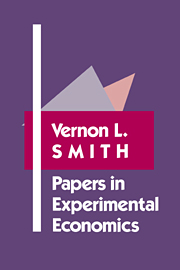Book contents
- Frontmatter
- Contents
- Preface
- Acknowledgments
- Part I The Formative Years
- Introduction
- 1 An Experimental Study of Competitive Market Behavior
- 2 Effect of Market Organization on Competitive Equilibrium
- 3 Nature, the Experimental Laboratory, and the Credibility of Hypotheses
- 4 Experimental Auction Markets and the Walrasian Hypothesis
- 5 Experimental Studies of Discrimination versus Competition in Sealed-Bid Auction Markets
- 6 Experimental Economics: Induced Value Theory
- 7 Bidding and Auctioning Institutions: Experimental Results
- 8 Intertemporal Competitive Equilibrium: An Empirical Study of Speculation
- 9 Experimental Economics at Purdue
- Part II Institutions and Market Performance
- Part III Public Goods
- Part IV Auctions and Institutional Design
- PART V Industrial Organization
- Part VI Perspectives on Economics
3 - Nature, the Experimental Laboratory, and the Credibility of Hypotheses
Published online by Cambridge University Press: 06 July 2010
- Frontmatter
- Contents
- Preface
- Acknowledgments
- Part I The Formative Years
- Introduction
- 1 An Experimental Study of Competitive Market Behavior
- 2 Effect of Market Organization on Competitive Equilibrium
- 3 Nature, the Experimental Laboratory, and the Credibility of Hypotheses
- 4 Experimental Auction Markets and the Walrasian Hypothesis
- 5 Experimental Studies of Discrimination versus Competition in Sealed-Bid Auction Markets
- 6 Experimental Economics: Induced Value Theory
- 7 Bidding and Auctioning Institutions: Experimental Results
- 8 Intertemporal Competitive Equilibrium: An Empirical Study of Speculation
- 9 Experimental Economics at Purdue
- Part II Institutions and Market Performance
- Part III Public Goods
- Part IV Auctions and Institutional Design
- PART V Industrial Organization
- Part VI Perspectives on Economics
Summary
INTRODUCTION
Hypothesis formulation and testing has been the primary means of extension of scientific knowledge in every discipline. Both the natural and social sciences have employed testing in the experimental laboratory to provide evidence as to the validity of hypotheses. In recent years, the classical techniques of experimental social psychology have been adapted for testing hypotheses in economic models of bilateral bargaining (Siegel & Fouraker, 1960), oligopoly (Fouraker & Siegel, 1961; Suppes & Carlsmith, 1962; Hoggatt, 1959), and large-group competitive-price formation (Smith, 1962). Since the data normally available to the economist are gathered for nonscientific purposes under uncontrolled and often incompletely specified conditions, it has been extremely difficult to construct satisfactory tests of economic propositions. For this reason the potential contribution of experimental methodology to economic knowledge is of unique importance. Yet these new developments raise a challeng ing question which is germane not only to economic applications but to the experimental method generally. What is the relevance of a laboratory experiment to the phenomena of nature or commerce, which is of primary interest to the scientist? The economist has no interest, as such, in sophomores playing game simulations of a duopoly situation for money, unless the behavior of these subjects corresponds in some way to general economic behavior in similar decision situations.
- Type
- Chapter
- Information
- Papers in Experimental Economics , pp. 56 - 63Publisher: Cambridge University PressPrint publication year: 1991
- 1
- Cited by



